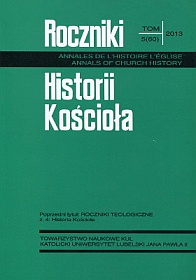Primate Hlond’s Stance on the Nazi and Soviet Totalitarian Regimes
Abstract
The main theme of the present article is the stance taken by Primate Hlond on the Nazi and the Soviet totalitarian regimes, as inferable from selected writings and public addresses he made in the period just before the outbreak of World War II. His assessment of the regimes is negative, and he definitively condemned both of them. In his addresses, he focused more on Communism, which he considered the greatest threat to humankind for its ideological background. The Primate concentrated on analysing the ideological grounds of the two totalitarian systems, without delving into their structural make-up. He expounded the philosophical, anthropological and cultural premises of the two aggressive ideologies of the 20th century. He accused them of a falsified vision of man and state. In this vision, the main ambition of man is to be in power and to dominate others. Undeniably, Hlond’s ideas coincide directly with the views of Pope Pius XI. In view of the fact of their frequent encounters, it is not irrational to assume that they exchanged their views on that matter. Hlond’s texts reveal a genuine sense of anxiety with the endangerment of the world’s peace, brought about by the two ideologies in question. Hence, on his visits to Germany and other countries, he did his best to mobilize the Church there - as well as the cultural milieus - to oppose the growing German National Socialism and the Soviet Bolshevism, pointing out a global cataclysm that these ideologies had power to evoke.
References
Adrianyi G.: Die Kirche in Nord-, Ost- und Südosteuropa, t. VII: Die Weltkirche im 20. Jahrhundert, w: Handbuch der Kirchengeschichte, hrsg. von H. Jedin i K. Repgen, Freiburg–Basel–Wien: Verlag Herder 1985.
Beaugrand G.: Kardinal von Galen, der Löwe von Münster, Münster 1996.
Bellocchi U.: Tutte le encicliche e i principali documenti pontifici emanati dal 1740. 250 anni di storia visti dalla Santa Sede, t. X: Pio XI (1922-1939), cz. 2: 1930-1939, Città del Vaticano 2002.
Biffi M.M.: Mons. Cesare Orsenigo. Nunzio apostolico in Germania (1930-1946), Milano: Nuove Edizioni Duomo 1998.
Biffi M.M.: Il cavalletto per la tortura. Cesare Orsenigo, ambasciatore del papa nella Germania di Hitler, wstęp G. Lajolo, Roma: Città Nuova 2006.
Dzwonkowski R.: Kościół katolicki w ZSSR 1917-1939. Zarys historii, Lublin: TN KUL 1997.
Falasca S.: Un Vescovo contro Hitler. Von Galen, Pio XII e la resistenza al nazismo,Milano: San Paolo 2006.
Halecki O.: Tysiąclecie Polski Katolickiej. Sacrum Poloniae Millennium. Rozprawy – Szkice – Materiały historyczne. Tom jubileuszowy Chrztu Polski 966-1966, Roma 1966.
Janeczek Z.: Społeczno-patriotyczny wymiar nauczania kardynała Augusta Hlonda, w: Ks. Kardynał August Hlond – społeczny wymiar nauczania, red. G. Polok, Katowice 2006, s. 99-168.
Krasowski K.: Episkopat katolicki w II Rzeczypospolitej. Myśl o ustroju państwa – postulaty, realizacja, Warszawa–Poznań 1992.
Portmann H.: Der Bischof von Münster. Das Echo eines Kampfes für Gottesrecht und Menschenrecht, Münster, 1946.
Serwatka T.: Koncepcje społeczno-polityczne Prymasa Polski Augusta Hlonda (1926-1948), Poznań: Hlondianum 2006.
Wielgoß J.: Deutsche Stimmen über die Reise des Kardinals August Hlond im Februar 1928 durch Deutschland, „Ricerche Storiche Salesiane“ 38(2001), s. 91-109.
Wilk S.: Episkopat Kościoła katolickiego w Polsce w latach 1918-1939, Warszawa: Wydawnictwo Salezjańskie 1992.
Zimniak S.: Salesiani nella Mitteleuropa. Preistoria e storia della provincia Austro-Ungarica della Società di S. Francesco di Sales (1868 ca.-1919), Roma: LAS 1997.
Zimniak S.: Salesiani di Don Bosco nella Małopolska (1892-1919), w: Kościół na drogach historii. Księga jubileuszowa dedykowana Księdzu Profesorowi Doktorowi Tadeuszowi śliwie, red. J. Wołczański, Kwów–Kraków: Wydawnictwo Bł. Jakuba Strzemię Archidiecezji Lwowskiej Ob. Łac. 1999, s. 127-130.
Zimniak S.: „Dusza wybrana”. Salezjański rodowód kardynała Augusta Hlonda Prymasa Polski, Warszawa–Rzym: Wydawnictwo Salezjańskie – Libreria Ateneo Salesiano 2003.
Copyright (c) 2013 Roczniki Historii Kościoła

This work is licensed under a Creative Commons Attribution-NonCommercial-NoDerivatives 4.0 International License.

